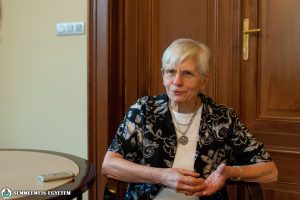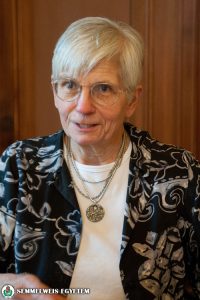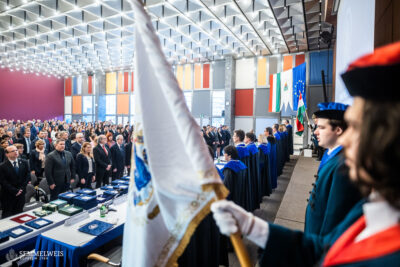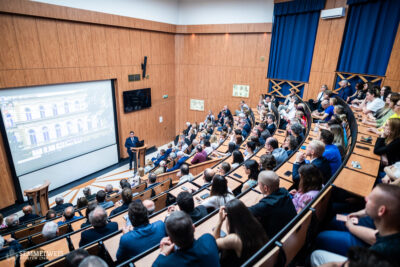Constance Putnam is an American medical historian who first heard about Ignaz Semmelweis at the age of six, thanks to her father. She first visited Hungary in 1994 and was immediately enchanted by the country and the language. Both events played a significant role in choosing her research area. Currently she is working on a book about Semmelweis and his era, and her aim is to make the saviour of mothers known to the American audience as more than the “handwashing guy”.
 Constance Putnam was brought up in a small town in New Hampshire and the medical office of her father was part of the family home. As a child, she was fascinated by the basins for handwashing equipped with a knee-operated tap that every examination room had. Her father told her that the special tap enabled people to keep their hands germ-free, and that it had been a Hungarian physician who first discovered the importance of handwashing in the prevention of infectious diseases.
Constance Putnam was brought up in a small town in New Hampshire and the medical office of her father was part of the family home. As a child, she was fascinated by the basins for handwashing equipped with a knee-operated tap that every examination room had. Her father told her that the special tap enabled people to keep their hands germ-free, and that it had been a Hungarian physician who first discovered the importance of handwashing in the prevention of infectious diseases.
This long-time memory came back to her when she started to deal with medical history after finishing her studies in philosophy, German and Latin. She first visited Hungary in 1994 and came back 2 years later to work together with Jimmy Carter as a volunteer on a Habitat for Humanity site, the first homes the charity built in Hungary. The American researcher fell in love with Hungary and the language, as she has always been interested in foreign languages.
“I decided not to give a chance to the Hungarian language to overwhelm me.”, she said
Thus, when she had to narrow down her post-doctoral research topic after obtaining her PhD degree, there was no question about her choice falling on Semmelweis due to her childhood memories and her experiences in Hungary as an adult. She was convinced she had made the right decision after realising how little and fragmentary the information on Semmelweis’ life and work provided by English and German literary sources was. She also became interested in Semmelweis’s “best friend”, whose name she could not initially find. As she later learned, it was Lajos Markusovszky, who was not mentioned in American literary sources even though he had also greatly contributed to the development of medical science. Lajos Markusovszky founded Orvosi Hetilap (Medical Weekly) six years after the first such journal was launched in Vienna.
 “American literature’s portrayal of Semmelweis is far from complete. It mainly focuses on his discovery, his difficulties, the resistance of his fellow physicians, his return to Budapest, his mental deterioration and death. There is no information on those 15 years that he spent in Hungary publishing scientific articles and being an active practitioner.”, she said
“American literature’s portrayal of Semmelweis is far from complete. It mainly focuses on his discovery, his difficulties, the resistance of his fellow physicians, his return to Budapest, his mental deterioration and death. There is no information on those 15 years that he spent in Hungary publishing scientific articles and being an active practitioner.”, she said
No wonder the American audience’s knowledge is fragmentary regarding his career and looks upon Semmelweis as a tragic hero, or in most of the cases, just as the “handwashing guy”.
“I am determined to fill the knowledge gaps. This encouraged me to delve deeper into the acquisition of the Hungarian language, therefore my vocabulary is quite specialised now. I know words such as contamination, infectious, syphilis, autopsy or septicemia better than colloquial conversational phrases,” she joked.
Thanks to a Fulbright scholarship she did research on Semmelweis in Budapest between 2005 and 2006, when she spent a lot of time in the Semmelweis Museum, Library and Archives of the History of Medicine reading medical journals from the 19th century. Since then she has come back to Hungary several times for shorter and longer periods.
Currently she is working on an English book about Semmelweis which will aim to provide a broader context for understanding his story by introducing the era he lived in and depicting the intense intellectual life of the Hungarian medical community in the 1850s and 1860s.
Constance Putnam also wrote a chapter in the book titled “In Memory of Ignaz Semmelweis” published as a tribute to the Semmelweis memorial year. This chapter is a kind of review essay of what is available in American literature about Semmelweis.
Pálma Dobozi
Photo: Attila Kovács – Semmelweis University
Translation: Ágnes Raubinek


